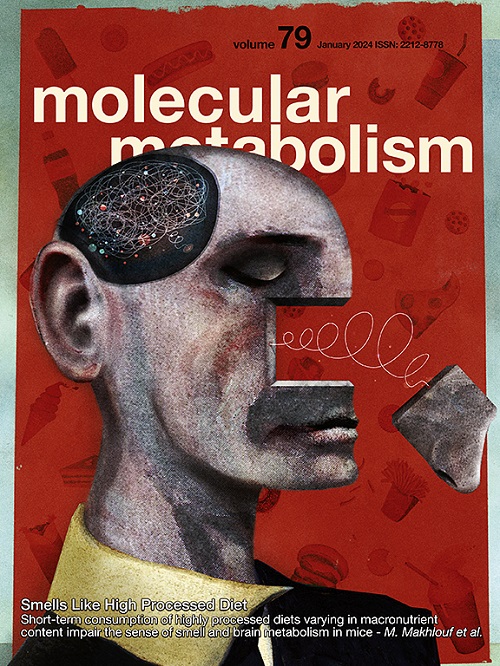Effects of children's microbiota on adipose and intestinal development in sex-matched mice persist into adulthood following a single fecal microbiota transplantation
IF 7
2区 医学
Q1 ENDOCRINOLOGY & METABOLISM
引用次数: 0
Abstract
Background
The global prevalence of obesity and type 2 diabetes, particularly among children, is rising, yet the long-term impacts of early-life fecal microbiota transplantation (FMT) on metabolic health remain poorly understood.
Objectives
To investigate how early-life FMT from children to young, sex-matched mice influences metabolic outcomes and adipose tissue function in later, adult life.
Methods
Germ-free mice were colonized with fecal microbiota from either lean children or children with obesity. The impacts on brown adipose tissue (BAT), white adipose tissue (WAT), glucose metabolism, and gut health were analyzed in male and female mice. Microbial communities and metabolite profiles were characterized using sequencing and metabolomics.
Results
Male mice receiving FMT from obese donors exhibited marked BAT whitening and impaired amino acid and glucose metabolism. In contrast, female recipients developed hyperglycemia, accompanied by gut barrier dysfunction and WAT impairment. Distinct microbial and metabolite profiles were associated with these phenotypes: Collinsella and trimethylamine in females; and Paraprevotella, Collinsella, Lachnospiraceae NK4A136, Bacteroides, Coprobacillus, and multiple metabolites in males. These phenotypic effects persisted despite changes in host environment and diet.
Conclusions
Early-life FMT induced long-lasting effects on the metabolic landscape, profoundly affecting adipose tissue function and systemic glucose homeostasis in adulthood. Donor dietary habits correlated with the fecal microbial profiles observed in recipient mice. These findings highlight the critical need for identifying and leveraging beneficial exposures during early development to combat obesity and diabetes.
单一粪便微生物群移植后,儿童微生物群对性别匹配小鼠脂肪和肠道发育的影响持续到成年
全球肥胖和2型糖尿病的患病率,特别是在儿童中,正在上升,但早期粪便微生物群移植(FMT)对代谢健康的长期影响仍然知之甚少。目的研究幼年到幼年性别匹配小鼠的FMT对成年后代谢结局和脂肪组织功能的影响。方法用来自瘦弱儿童和肥胖儿童的粪便菌群定殖无菌小鼠。分析了其对雄性和雌性小鼠棕色脂肪组织(BAT)、白色脂肪组织(WAT)、葡萄糖代谢和肠道健康的影响。利用测序和代谢组学对微生物群落和代谢物谱进行了表征。结果接受肥胖供体FMT的小鼠表现出明显的BAT增白,氨基酸和葡萄糖代谢受损。相反,女性受体出现高血糖,并伴有肠屏障功能障碍和WAT损伤。不同的微生物和代谢物谱与这些表型相关:雌性的Collinsella和三甲胺;Paraprevotella, Collinsella, Lachnospiraceae NK4A136, Bacteroides, Coprobacillus和多种代谢物。尽管宿主环境和饮食发生了变化,这些表型效应仍然存在。结论早期FMT对代谢景观产生长期影响,深刻影响成年期脂肪组织功能和全身葡萄糖稳态。供体饮食习惯与在受体小鼠中观察到的粪便微生物特征相关。这些发现强调了在发育早期识别和利用有益暴露来对抗肥胖和糖尿病的迫切需要。
本文章由计算机程序翻译,如有差异,请以英文原文为准。
求助全文
约1分钟内获得全文
求助全文
来源期刊

Molecular Metabolism
ENDOCRINOLOGY & METABOLISM-
CiteScore
14.50
自引率
2.50%
发文量
219
审稿时长
43 days
期刊介绍:
Molecular Metabolism is a leading journal dedicated to sharing groundbreaking discoveries in the field of energy homeostasis and the underlying factors of metabolic disorders. These disorders include obesity, diabetes, cardiovascular disease, and cancer. Our journal focuses on publishing research driven by hypotheses and conducted to the highest standards, aiming to provide a mechanistic understanding of energy homeostasis-related behavior, physiology, and dysfunction.
We promote interdisciplinary science, covering a broad range of approaches from molecules to humans throughout the lifespan. Our goal is to contribute to transformative research in metabolism, which has the potential to revolutionize the field. By enabling progress in the prognosis, prevention, and ultimately the cure of metabolic disorders and their long-term complications, our journal seeks to better the future of health and well-being.
 求助内容:
求助内容: 应助结果提醒方式:
应助结果提醒方式:


